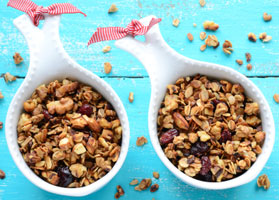Best Green Tea for PCOS: Brands & Benefits
Discover the best green tea for pcos with our expert brand reviews. Learn how green tea pcos benefits support hormone balance, insulin sensitivity, and weight management.
This granola can make a satisfying snack on it's own or your can use it to top yogurt or oatmeal. This recipe uses agave nectar, a popular alternative to sugar or honey. However, you should still count the carbs in agave like any other carbohydrate and ke
This recipe includes superfoods such as:
Cinnamon, Cranberries, Nuts, Agave, Walnuts
Transform your health with tailored 7-day meal plans designed specifically for PCOS management. Just $7/month or $59/year.
Get it now →1/3 cup agave nectar
3 tablespoons Splenda Brown Sugar blend
2 cups rolled oats
1/2 teaspoon cinnamon
1/8 teaspoon nutmeg
2/3 cup roasted pumpkin (pepita) seeds
2/3 cup dried cranberries
1/2 cup chopped walnuts
Preheat oven to 300 degrees F. Line a baking sheet with parchment paper.
In a small bowl, whisk together agave nectar and Splenda Brown Sugar blend.
In a medium bowl, mix together all remaining ingredients. Pour agave nectar over mixture and stir to coat.
Spread oat mixture on baking sheet and bake for 30 minutes. Let cool and store in airtight container.
MAKE IT GLUTEN-FREE: This recipe can be made gluten-free by using gluten-free oats and confirming all other ingredients are gluten-free.

You know the drill: Alarm goes off. You hit snooze. Rush around frantically. Skip breakfast AGAIN because there's no time. By 10am, you're hangry, your blood sugar is all over the place, and your PCOS symptoms are already acting up.
Sound familiar?
Finally – a meal prep system designed specifically for women with PCOS who refuse to let chaotic mornings derail their health goals.
In just ONE hour on Sunday, you can transform your entire week:
"I went from skipping breakfast 4 days a week to having delicious, hormone-supporting meals ready every morning. My energy is more stable and my cravings have disappeared!"
– Sarah M.
Stop letting chaotic mornings control your health.
Get your hormone-happy mornings starting this Sunday.
→ Get Your 60-Minute Solution Now
Transform your health with tailored 7-day meal plans designed specifically for PCOS management. Just $7/month or $59/year.
Get it now →Serving Size: 14
| Amount Per ONE Serving | ||
|---|---|---|
| Calories 160 kcal | ||
| Fat 6 g | ||
| Carbohydrate 23 g | ||
| Protein 4 g | ||
| Saturated Fat 0.9 g | ||
| Sugar 11 g | ||
| Fiber 2 g | ||
💡 Introducing the 10/10 PCOS Solution:
Ten Delicious Crockpot Recipes that take just 10 minutes to prep!
Say goodbye to hours in the kitchen and hello to clean, PCOS-friendly meals made effortlessly.
👉 Click here to grab your 10/10 PCOS Solution today! Try The 10/10 PCOS Solution: Ten Crockpot Recipes That Take Just Ten Minutes to Prep
Managing PCOS can be challenging, but you don't have to do it alone. Join our supportive community to connect with others who understand what you're going through, share tips, and get encouragement. Here's how you can get involved:
Subscribe to our Newsletter: Receive PCOS-friendly recipes, tips, research updates, and more delivered straight to your inbox. Stay informed and empowered with the latest information and support.
Join our Telegram Channel: Stay updated with the latest tips and advice on managing PCOS.
Follow PCOS Meal Planner on Facebook: Engage with our community, participate in discussions, and get support from others.
Break the cycle with the PCOS Meal Planner - your personalized guide to eating better, feeling better, and managing PCOS symptoms. Take control today!

Forget the frustrating cycle of weight loss attempts, endless medications, and living in discomfort. Introducing the PCOS Meal Planner. A meal planning guide that goes beyond temporary fixes to offer a comprehensive strategy, empowering you to ignite a transformation towards lasting health and happiness. Step into a world where you control your PCOS, not the other way around.
Unlock Your PCOS Freedom Now.
Discover the best green tea for pcos with our expert brand reviews. Learn how green tea pcos benefits support hormone balance, insulin sensitivity, and weight management.
Discover the best pcos meal delivery services for 2025. Expert reviews of top meal delivery for pcos options that support hormone balance and insulin sensitivity.
Discover 30 simple pcos meals for picky eaters that help manage symptoms. Easy pcos meals picky eaters will love, with practical tips and hormone-balancing ingredients.
Discover 15 delicious overnight oats for PCOS recipes that help balance hormones and manage symptoms. Easy, nutritious breakfast ideas perfect for women with PCOS.
Discover the best cereal for PCOS with our expert rankings. Compare brands, check ingredients, and find PCOS friendly cereal that supports hormonal balance.
Learn how to transition away from fruit when starting a ketogenic diet for PCOS. Discover gradual strategies, fruit alternatives, and practical tips for success.
Discover 5 delicious PCOS banana bread recipes with low-glycemic ingredients. Learn how to make hormone-friendly banana bread that supports blood sugar balance.
Creatine for women with PCOS explained simply. Learn safety, benefits, hormone effects, tips, and how creatine may support PCOS symptoms naturally.
Complete PCOS diet plan with foods to eat, foods to avoid, meal timing, and real results. Learn the science-backed approach to managing PCOS through diet, with 7-day meal plan, grocery list, and step-by-step implementation guide. Based on clinical research and real patient outcomes.